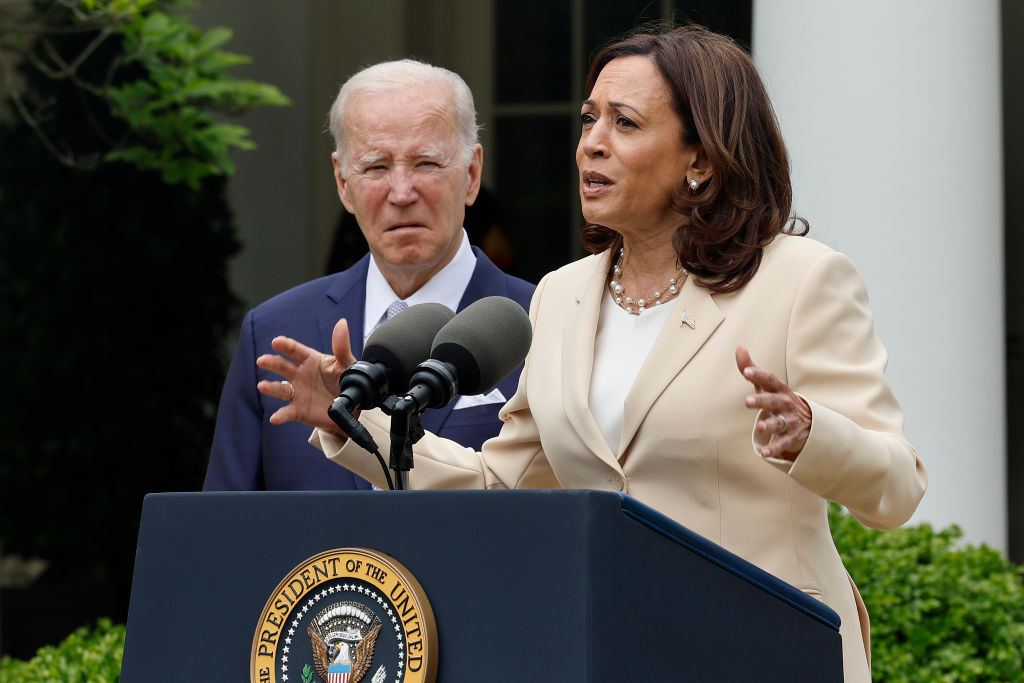Have you ever cringed so hard that you pulled a muscle?
It happened to me a few days ago when I saw this.
As my colleagues at The Morning Dispatch noted, when Pelosi was given a second chance during that interview to defend Kamala Harris, she resorted instead to arguing that it’s the nature of the vice presidency for its occupant not to do very much in the job.
How’s that for a vote of confidence in someone who’s an 80-year-old heartbeat away from being leader of the free world and her party’s all-but-certain nominee for president?
If you’ve spent any time reading political media in the past week, you’ve noticed a theme. “President Biden should not run again in 2024,” David Ignatius wrote in the Washington Post on Tuesday. It was David Von Drehle’s turn on Thursday: “Democrats are crazy to insist only Biden can beat Trump.” On Friday, Jonathan Chait chimed in at New York magazine with “Challenging Biden is risky. So is nominating him.” News reporters have also begun to bore in on the president’s age, even contrasting him unfavorably with his nearly-as-old likely Republican opponent.
Why the crescendo in calling for Biden to reconsider running for reelection?
A few reasons, some of them pedestrian. For instance, the media is clearly bored with the presidential race at the moment because the GOP primary has turned boring. As I write this, Donald Trump has reached a new high in the RealClearPolitics national average while Ron DeSantis has matched his lowest polling of the campaign. “Who will the Republican nominee be?” suddenly seems like a less provocative question than “Who will the Democratic nominee be?”
But there are more compelling reasons for rising Biden anxiety.
In the span of three days this week, the president’s Justice Department indicted his son on gun charges while the president himself was made the target of a House impeachment inquiry. A few days earlier, Biden gave a “troubling” performance at a televised press conference in Vietnam. Meanwhile, the deadline for prospective Democratic primary challengers to announce their candidacies is drawing near: In the important early state of Nevada, the last day to file with the secretary of state is October 16.
Then there’s the polling.
The data CNN published last week was as ugly for Biden as it could plausibly be. His favorable rating stands at 35 percent; some 46 percent of registered voters say any Republican candidate would be a better choice for president than him; 58 percent say his policies have made economic conditions in the U.S. worse; and fully two-thirds of Democrats and leaners believe it’s very or extremely likely that he’ll be the party’s nominee.
The numbers on the tender subject of his age are gruesome. Roughly three-quarters of all Americans are “seriously concerned” that his age might be affecting his mental and physical competence and that he might not finish a second term if reelected. That’s in line with another recent poll that found 77 percent of adults think Biden is too old to serve again as president. When CNN asked respondents whether he currently has the stamina and sharpness to do his job, only 26 percent said yes.
Americans don’t agree on much, but practically everyone—although not quite everyone—agrees someone of Biden’s age shouldn’t be in the White House.
Some liberals, unable to cope with the reality that their guy might lose next year to that terrible person, have retreated into conspiratorial fantasy about the methodology of the polling. But savvier types like David Ignatius and the rest have absorbed the data and concluded that 2024 is a rare case in which renominating an incumbent isn’t the strongest hand a political party can play.
All of this is a problem for Democrats, but not actually a huge problem. In theory.
Normally, choosing not to run for reelection would be taken as an admission by the president that his first term was a failure. That admission would likely doom his party in the general election.
Because the issues of age and competence loom so large for Biden, though, he could retire while kinda sorta credibly claiming to be going out on top. I’ve done what I set out to do, he might say. There are no more mountains to climb. It’s time for the next generation of leaders to take charge (echoing Mitt Romney from a few days ago). He might even point to the examples of Mitch McConnell and Dianne Feinstein and note that America can’t risk that sort of decline in an officer like the president, who may be called on to make choices of life and death at a moment’s notice.
Then he would gallantly stand down and make way for his much younger vice president to accept the party’s nomination and lead it into the future.
Which is where this really does become a huge problem. Hardly anyone on either side believes the scenario I’ve described would help Democrats more than hurt them. The party’s Joe Biden crisis is ultimately a Kamala Harris crisis.
Josh Barro recognizes that. While most of the media were writing “Joe must go” pieces this week, Barro was at work on an “actually, Kamala must go” rejoinder. Yes, he concedes, it would be better if Biden weren’t the nominee, but the president opting to retire would trigger a brutal and ultimately self-defeating primary. The eventual winner would be dragged to the left for the sake of pandering to the progressive base and would face vicious attacks from challengers lured into the race by a sudden free-for-all for the presidency.
The vacuum left by Biden at the top of the ticket would end up doing the party more harm than good, Barro concludes. But a vacuum at the bottom of the ticket could be just the trick to convince wary swing voters to roll the dice on Grandpa Joe for a second term. “A vote for President Biden is a vote for President Harris,” Republicans will claim next summer. What if, Barro wonders, a vote for President Biden were a vote for President Whitmer instead?
In 2018, Gretchen Whitmer was elected governor of Michigan by a margin of 9.5 percentage points. She was re-elected last year by a margin of 11.6 points. She has presided over a broader resurgence of Michigan’s Democratic Party, which has used the state’s ballot initiative process to protect abortion rights and end partisan gerrymandering. With her coattails and new fair maps, Democrats won control of both houses of Michigan’s state legislature last year, consolidating full control over state government for the first time in decades. And they have used their narrow majorities to pursue a progressive agenda, including repeal of the state’s right-to-work law.
Democrats’ overperformance in Michigan under Whitmer has also extended to races for national office. As Nate Cohn wrote for the New York Times this week, Democrats’ loss of ground with voters since 2020 has been unevenly distributed. More than 100% of the loss is with non-white voters — that is, Democrats are actually running very slightly better with white voters than they did in 2020 — and the loss is also much more acute in some states than others. Nationally, Democrats put up House race margins in 2022 that were, on average, more than 6 points worse than in 2020. But in Michigan, the deterioration was less than 1 point, moving Michigan from right of the national average to left of it.
If Biden can maintain the “blue wall” in the Midwest of Michigan, Pennsylvania, and Wisconsin, he could win reelection (very narrowly) even if he lost Georgia, Nevada, and Arizona. Replacing the unpopular Kamala Harris with a popular young Midwestern governor would probably increase the odds of that happening.
I agree with Barro that Whitmer is the strongest Harris substitute available. Josh Shapiro in Pennsylvania and Wes Moore in Maryland are promising up-and-comers, but neither has been governor of his state for even a year. Gavin Newsom doesn’t have that problem, but he does have the problem of, uh, being Gavin Newsom, the living incarnation of “California values” culturally and governmentally. I find it hard to believe Americans would vote for that even against an opponent as loathsome as Trump.
Raphael Warnock is another formidable option, having won two statewide races in Georgia, but Warnock’s elevation to the vice presidency would create a vacancy in the Senate that might hand control of the chamber to Republicans. And Warnock has the same “diversity” issue that Shapiro, Moore, and Newsom have: He’s a man who’d be replacing the first female vice president in American history—in a party that relies heavily on female voters.
Whitmer doesn’t have a diversity issue. At least, not that diversity issue.
There are other reasons to dump Harris, writes Eric Levitz at New York magazine. Even in the best case scenario where a Biden-Harris ticket is reelected, being a two-time winner will make the current VP a solid favorite to be the Democratic nominee in 2028 and an all but prohibitive favorite if she’s already succeeded Biden as president by then. That would be a bad place for the party to be (especially with Trump possibly running again!) given that Harris has performed dismally not once but twice in major elections, including in her home state of California.
And if you think she’s unpopular now, Levitz adds, wait until she’s taking the full brunt of right-wing attacks as the leader of her party. Rarely do voters come to view politicians more favorably rather than less after they run for president. Ron DeSantis, for instance, had a net positive favorable rating as recently as May and now stands at 36-50.
Kamala Harris is scarcely better at 37.1-54.3, a few points less popular than Joe Biden and the guy who’s been indicted four times. In dozens upon dozens of polls since the summer of 2021, in fact, not once has she registered a favorable rating that’s positive on balance. And when Democrats try to do something about that, putting her in front of cameras in hopes of rehabbing her image, Quayle-esque hijinks ensue with alarming regularity.
There’s every reason, in short, to believe she’ll be a liability on the Democratic ticket next year. Or rather, every reason but one.
Which brings us back to that other diversity issue.
Barro and Levitz have the same ready answer to objections that the first black vice president shouldn’t be dumped for a white replacement. Look at her electoral record, they note, and you’ll find that African American voters aren’t particularly excited about her. Biden is more popular among that cohort than she is, as he proved when the two ran against each other in 2020. Plus, because black voters tend to be loyal Democrats, there’s a good chance they’d ultimately put aside any disgruntlement over Harris being jettisoned and support the party in the end.
Both also point to the fact that having her as VP hasn’t stopped Biden from losing ground among African Americans without college degrees. If she’s not helping him with black voters, he may as well replace Harris with Whitmer and see if that helps with swing voters.
I’m open to that possibility. But it strikes me as an exceptionally risky bet, especially with African Americans already shifting away from the party.
It’s true that black Democrats appear to have no great affection for Kamala Harris, but the symbolism of dumping her for a white substitute is, to borrow a word from the left, problematic. It smacks of scapegoating, for one thing. If Joe Biden were 10 years younger and hadn’t foolishly ignited an inflation crisis with reckless COVID spending, he’d be on a glide path to defeating Trump with Vice President Harris at his side. For America’s progressive party especially, blaming a black politician for the flaws of her white running mate is a bad look.
I mean, if someone like former Republican consultant Stuart Stevens is already this hysterical about the prospect of ditching her, imagine how devout liberals will sound:
Another problem would be the perception among some that the party is “moving backward” on race. I think that’s silly; in the last 11 years, Democrats have elected an African American president and vice president, and Moore and Warnock will be top-tier presidential candidates if the primary is contested in 2028. But for some, progress on diversity is a one-way ratchet. If the Democratic ticket were to become less diverse, even if doing so made it more competitive with Republicans, some liberals might draw an unhappy inference about party leaders wanting black votes without wanting to share power.
Other voters might resent what they perceive to be “second-class” treatment of Harris. The vice presidency isn’t any ol’ Cabinet job, after all. Traditionally it’s amounted to a designation as heir apparent, next in line for the party’s nomination. (Sorry, Mike Pence!) Kamala Harris is closer to becoming president than any African American in U.S. history except one. To push her out of the way at the last moment, at the brink of power, for a generic white Democrat like Whitmer might be taken as cheating her of what she’s owed. The party used her to win, then threw her away rather than have her as a leader.
That complaint could be particularly dicey for Democrats given that one of the country’s most famous black activists, Cornel West, is leading the Green Party ticket this year. If there’s a protest vote based on how Harris was treated, that’s an obvious place for those votes to go. If I were Joe Biden, already bleeding working-class African American votes to Trump, I’d be more than a little nervous about how soft my support might be among black voters who haven’t yet bolted the party. What effect might seeing Harris unceremoniously fired have on them?
I concede, though, that all of this is supposition. In fact, while writing this I recalled a piece Jonathan Capehart published during the early stages of the Democratic primary in 2019. Capehart, who’s African American, asked his relatives at a family barbecue whom they liked for president in the coming election. His aunt told him her favorite candidate was Kamala Harris—but added that she wouldn’t be casting a ballot for her.
One aunt said something my mother said to me nearly a year ago. That it’s going to take a white man to straighten out the mess we’re in. “The way the system is set up now, there is so much racism that it’s going to have to be an old white person to go after an old white person,” my aunt told me. “Old-school against old-school.” She talked further about what this meant for younger candidates such as [Pete] Buttigieg. “The whole world is in a crazy state, and somebody’s gotta put it back in order. And I think a lot of the young people who want to put it back in order, want to change it completely,” she continued. “But first, you’ve got to put it back in order before you can start changing it.”
Biden is the one who can beat Trump, his aunt went on to say, presciently. That sort of bottom-line pragmatism is exactly what Democrats would need from their base, especially African Americans, if the White House concludes that Biden-Whitmer stands a meaningfully better chance of victory than Biden-Harris.
But a “clean” break that avoids roiling the party would require a few things to make it clean, none of which seem likely.
Kamala Harris would need to somehow not be humiliated while being replaced. How does that happen? What non-humiliating excuse could be given for making her the first sitting vice president in 80 years to be dropped from a national ticket? “She’s a bad politician,” “people don’t like her,” and “she sounds out of her depth in interviews” won’t cut it.
The obvious solution in politics when you want someone out of one job is to offer them another. But there’s no job Biden could offer his vice president that wouldn’t amount to a major demotion except, perhaps, for Supreme Court justice. And there don’t look to be any openings there anytime soon.
The White House PR campaign defending Harris’ replacement on the ticket would also benefit greatly from being led by prominent black Democrats. But who wants a task as thankless as that?
Perhaps Biden’s old friend James Clyburn would volunteer to lead the effort, but the optics of powerful African American politicians making the case against the country’s most powerful African American politician on behalf of a white ally and patron would be iffy. I wouldn’t blame anyone for declining Biden’s request to do it, refusing to insert themselves into the middle of a messy divide among black Democrats over whether the first black VP was given short shrift by the party’s mostly white establishment.
Meanwhile, there’s no telling how a substitute VP candidate like Gretchen Whitmer might hold up to the scrutiny of a national campaign. Maybe she’d survive a close vetting by the media the way Harris did. Maybe she’d manage to avoid descending into word salad during interviews the way Harris very much did not.
Or maybe not. Imagine if Biden dumped Harris, pissing off her fans, and then Whitmer proved to be not ready for primetime either.
The only “clean” (or clean-ish) exit from this mess would be for Harris herself to step down voluntarily for the good of the party and the country given the unacceptable risk that a second Trump presidency obviously presents. But good luck persuading her to accept very early political retirement instead of clinging to her job, hoping for a repeat victory in 2024, and then waiting for Father Time to take care of Biden. Kamala Harris may stand roughly as much of a chance of being president by, say, 2026 as either Joe Biden or Donald Trump does, frankly; asking a politician to swallow her ambition and throw away an opportunity as precious as that is asking the impossible.
There’s no way out. No easy one, anyway.
Our email forwarding push wraps up today. If you think someone in your life might appreciate what we’re doing, go ahead and send them this email and encourage them to click the “sign up for this newsletter” link near the top. To do more of the kind of work we want to do, we need more members. And the best way to get more members is word of mouth from the people who know us best. Thanks for your help.









Please note that we at The Dispatch hold ourselves, our work, and our commenters to a higher standard than other places on the internet. We welcome comments that foster genuine debate or discussion—including comments critical of us or our work—but responses that include ad hominem attacks on fellow Dispatch members or are intended to stoke fear and anger may be moderated.
You are currently using a limited time guest pass and do not have access to commenting. Consider subscribing to join the conversation.
With your membership, you only have the ability to comment on The Morning Dispatch articles. Consider upgrading to join the conversation everywhere.